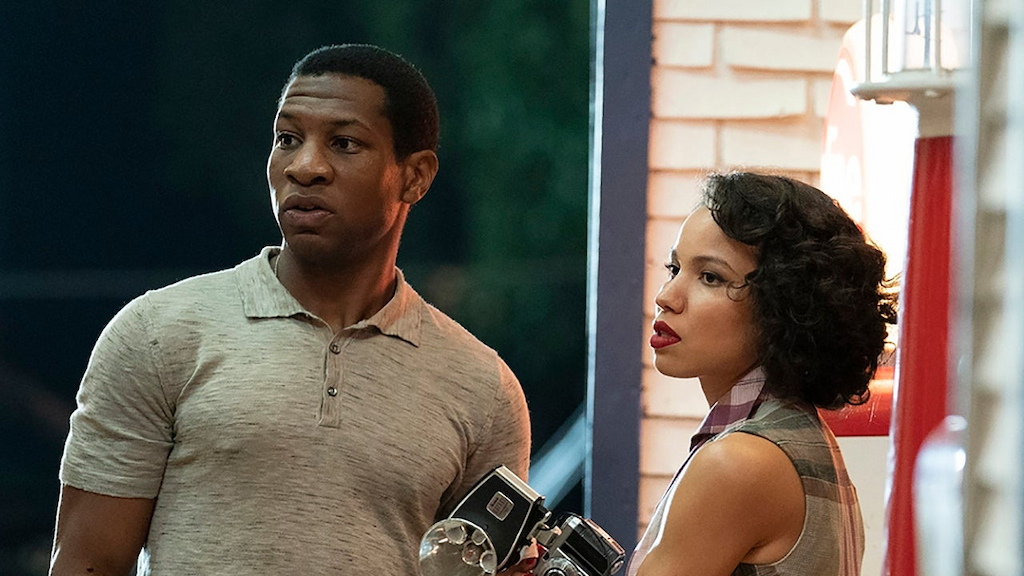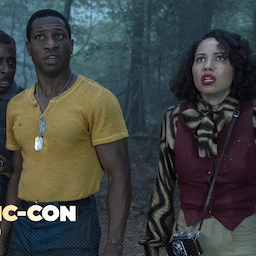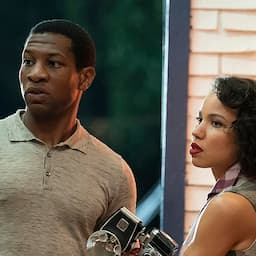Creator Misha Green and stars Jurnee Smollett and Jonathan Majors explain how the series centers Black experiences within the genre.
Lovecraft Country is shining a light on buried histories of America. Created by Misha Green and executive produced by Jordan Peele and J.J. Abrams, the 10-episode HBO series adapted from Matt Ruff’s novel sees an extended Black family in 1950s Chicago facing both racist terrors and supernatural horrors inspired by the likes of H.P. Lovecraft.
Similar to Watchmen, the superhero series that takes place in an alternative version of U.S. history, Lovecraft Country blends historical and real-life events with a fictional story. What starts off as a road trip through Jim Crow America expands into a saga of horrors that includes surviving shoggoths, fending off pagan societies, moving into a haunted house, hunting for magical scrolls and confronting a case of dueling identities while also depicting everything from sundown towns to the Tulsa race massacre of 1921.
“The history that is just as horrific as the monsters we made up, all of that has been buried,” says Green, the co-creator of WGN America’s Underground and self-proclaimed history buff. “One of the reasons for my love for the project and my excitement to do the project was uncovering all of these things that we have not been told when we center a narrative just around whiteness.”
Actress Jurnee Smollett, who plays Leti, adds, “There is such a danger when the truth is distorted and when your history has been overlooked for so long… It’s a real honor to be a part of something that centers our voices in such a radical way.”
In this case, Black characters -- played by an ensemble cast that also includes Jonathan Majors (Atticus), Michael K. Williams (Montrose), Courtney B. Vance (George) -- are at the center of the terrors experienced on the show, in which monsters are a metaphor for racism in America and real-life events are just as -- if not more -- horrific than any supernatural being.
The Forgotten War
Taking place from 1950 to 1953, the Korean War is often called the Forgotten War by many English-speaking countries, including the U.S., despite its involvement and support of South Korea during its military feud with North Korea. It’s considered lost in the collective memory due to the lack of public attention it received compared to the preceding War World II and subsequent Vietnam War.
The Korean War was also noted for being the first major war to include desegregated armed forces, with Black soldiers fighting along their white counterparts for the first time in American history. President Truman believed it would help end racial discrimination, but the war proved difficult for African Americans. The Korean War Legacy Foundation reports that “in 1950, American military commanders arrested fifty members of the all-black 24th Infantry Regiment and falsely accused them of AWOL (Absent Without Leave) and cowardice in the presence of the enemy.”
On Lovecraft Country, Atticus is a Korean War veteran plagued by dreams of a woman who may be connected to his time overseas. To get into character, Majors says he relied on stories he heard about his grandfather’s service in the Korean War and the nonfiction book The Coldest Winter: America and the Korean War, written by David Halberstam. “I read that a lot. I kept that with me for the run of the show and I would always dip into that,” he says.
Green Book
Created by New York City postal worker Victor Hugo Green, Green Book was an annual guidebook for African American travelers printed between 1936 and 1966. According to TheStar.com, it “listed guest homes, hotels, motels, restaurants and other businesses that served Black visitors: important information at a time when many establishments were still segregated, Jim Crow laws were in effect in some states and sundown towns existed.”
While the travel guide was recently depicted in the controversial Oscar-winning film Green Book, the HBO series shows how its version was used by Black communities and was as necessary to have on them as suggested by the book’s tagline, “Carry your Green Book with you… you may need it.” In this case, George and Hippolyta Freeman (Aunjanue Ellis) are researchers and reviewers for the guide, often taking road trips of their own to explore and vet various towns and locations throughout the country.
Ellis says there were replicas of the original on set they could look through. “It was really fascinating, all the places [in it]. And they would give a little reviews,” she recalls, adding, “I don't think it's a coincidence that [our character’s] names are Freeman, because they were folks who were self-liberated and trying to do that for themselves and their community through their travels.”
Jim Crow Laws
Following the Reconstruction Era after the Civil War, during which newly freed slaves were granted civil rights and several Black men were elected to the United States Congress, many state and local governments began disenfranchising African Americans by enacting laws to enforce racial segregation and dismantle their constitutional rights. These largely existed until the 1960s until the Civil Rights Act of 1964 and the Voting Rights Act of 1965.
While it’s largely perceived as a Southern movement, Green says the Jim Crow era encompassed all of America, which is why Atticus, George and Leti encounter racism during their road trip through New England states and even come across a sundown town in Massachusetts. “I feel like the fact that you say Jim Crow America and people say, ‘Oh, in the South,’ and I'm like, ‘Nope. This all takes place in the North.’ And they're like, ‘What? How can that be?’ And it’s like, ‘Because Jim Crow was everywhere,’” she explains. “It’s the same as slavery. It wasn't just in the South. But that's what we've been taught.”
Sundown Towns
One of the key moments from Ruff’s novel that jumped out to Green right away was the concept of sundown towns. Embolden by Jim Crow laws, all-white communities all across the country made it illegal for people of color to be in the area from sunset until sunrise. “I'm looking at these signs in history books. They’re real. ‘Don’t let the sun set on you here,’” Green says. According to Sundown Towns: A Hidden Dimension of American Racism, written by James Loewen, a Black person caught in town after sundown could be subject to harassment, violence or lynching.
On the show, Green wanted to depict the horrors of these places by having Atticus, Leti and George threatened by a white cop to leave before sunset. “I wanted to pick this kind of slow chase, the idea that you can't go over the speed limit, but you’ve got to get out of this town and away from these people,” she says.
Tulsa Race Massacre of 1921
From May 31 to June 1, 1921, one of the single worst acts of racial violence in American history took place as mobs of white residents of Tulsa, Oklahoma, attacked the Black people and Black-owned businesses of the city’s Greenwood District. According to The New York Times, it “was one of the worst outbreaks of racial violence in American history: a horrific spree of murder, arson and looting inflicted by white residents upon the prosperous African American community of Greenwood, followed by a shameless cover-up.” And in the 99 years since, the story has remained buried -- largely ignored in American history classes -- only to become a forgotten crucial part of history that’s only being recently rediscovered onscreen today, from Watchmen to Lovecraft Country.
Without giving away the twists of the plot, Ruff heavily cites the 2001 report "Tulsa Race Riot: A Report by the Oklahoma Commission to Study the Tulsa Race Riots of 1921" in his novel, and that’s expected to be replicated onscreen. More specifically, Major says, “We’re revealing an entire part of African American culture, what it was to be a part of an affluent, educated, forward-moving community… We show that and then we show what happened to it, the fact that they were thriving and then they were squelched.”
Lovecraft Country airs Sundays at 9 p.m. ET on HBO.
RELATED CONTENT:


